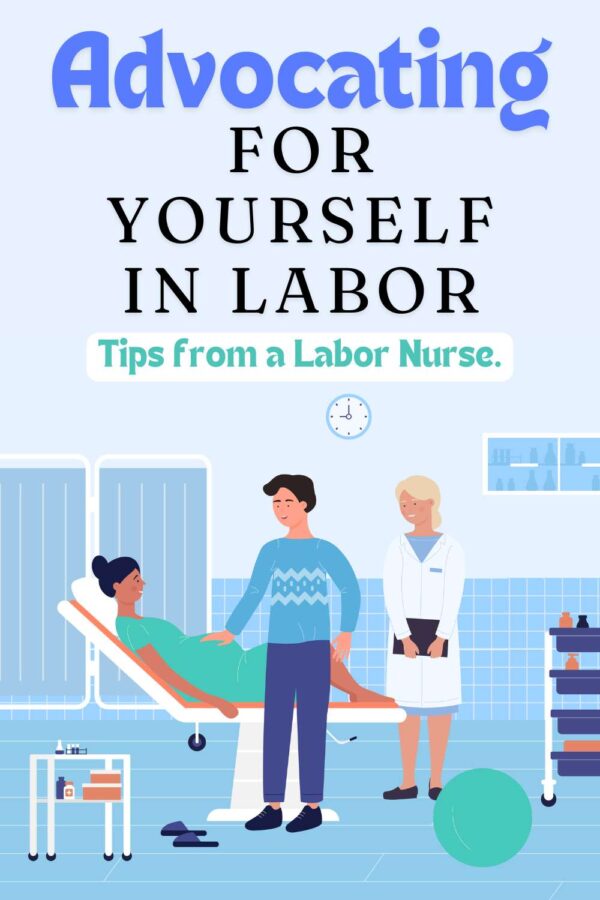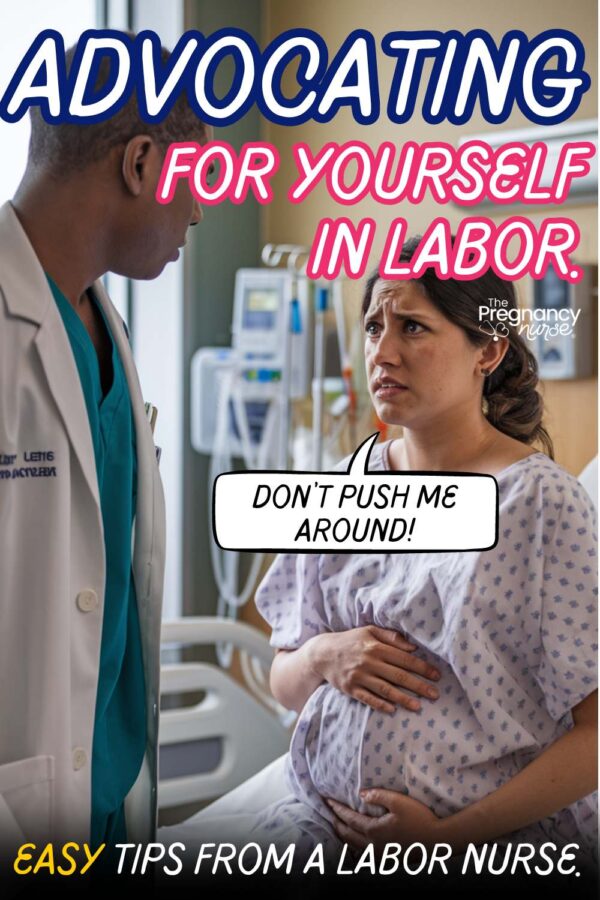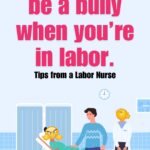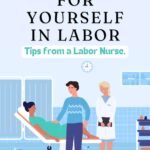📣 YOU are clearly getting prepared for pregnancy, birth & beyond — but do you wish your partner was more involved (looking for a teammate rather than just a cheerleader)? Couples love THIS! 💛🧡💚
Recently, I asked in a group of pregnant women what some of their biggest fears were about labor, and SO many said they were worried about being pushed around in labor and not being able to advocate for themselves. They said things like:
- Not being vocal enough about my wants and preferences
- I feel like I’ll be dismissed
- Staff not following my wishes
- Providers passively ignoring my wants and requests for my delivery and then bullying me with their preferences
- Not being listened to or told things
- Ignoring my questions
I 100% hate this, but I also see where they are coming from.
The good news: I will say that most people don’t feel like this in labor. They feel like this are done according to their wishes and they’re not bullied into things.
The bad news: There are still a good number of providers out there who think they run the show in the labor room (instead of the patient). I’ve worked with lots of those doctors (since I started in 2001 it was worse then, I can assure you).
Today I’m going to give you some tips on what you can do to not have things like that happen and how you can drive the bus, even when someone else wants to take the wheel.
There is a lot of “driving” analogies in here. The thing is, the bus has to move in the hospital. There are limited resources in the hospital — like beds and staff — and we have to make choices to move things forward. So, either you drive the bus, or we drive our regular route until you take over. We’re just looking for a driver…. let it be you.

The FIRST thing you need to do…
The first things you HAVE to do is to prepare yourself with truths.
The BEST thing you can do to stop any labor bullies is to prepare with a trusted expert. And that means even learning what can happen in your third trimester (because third trimester testing can sneak-up on you and suddenly choices are made without you even thinking about it), all the way through postpartum.
Knowing interventions that can happen, knowing choices, knowing why they might happen gives you a very clear picture of what you may be confronting in labor.
A lot of people cherry-pick the advice they want to hear, and I am here to say that it is REALLY important that you know what happens from beginning to end, so you’re actually prepared. Not pseudo-prepared with some social media posts.
I really think that if you want to advocate for yourself in labor you need to take a birth class. I actually no longer recommend hospital classes and I do recommend this one. It does get you informed from beginning to end and you’ll feel so much more confident and prepared.
That’s step one my friends, don’t skip it.
But, beyond let me give you a few things you can do to advocate for yourself in labor:
Learning to advocate for yourself in labor starts with learning to advocate for yourself in prenatal appointments.
When you don’t understand something, or want help with a specific problem — be specific on what you need and expect it be explained or help given. Feel free to stop them as they’re leaving and be very clear “My hips are really hurting and it’s affecting my day-to-day life — do you have ideas for me or can you refer me to someone who can help?” Be clear on what they need, so they can clearly help.
Ask Why
This is my old fall-back. When you’re tongue tied and feeling like you have no idea what to do and you’re sort of panicking — just ask why….
- Provider says they want to break your water — ask why?
- Provider says you can’t eat during labor — ask why?
- Provider says think they you need a cesarean — ask why?
In reality they should be doing this anyway, but often they skip it.
The truth is, a lot of patients don’t really want to know why — they just want to be told what to do.
I think that was much more true in the past than it is now, and when we teach providers that we want to know more so many are happy to share the why’s — you just have to ask.
Of course, after they give their “why’s” the choice is ALWAYS up to you.
Remember, the final choice is always up to you in labor. That isn’t to say that your choices may have consequences (like stopping the induction or the epidural) — but the choice is always up to you.
Really quick, when I was younger I had a REALLY hard time speaking up for myself in appointments I know a lot of people have this issue also – they’re just not comfortable with “confrontation” or anything that even seems like it.
If that’s you — now is the time to work on that. Work on it at the grocery store, or as you’re getting your hair done. Ask questions.
I’m not saying turn into a Karen — but just ask questions and then make choices on your own. You’re going to need this trait as a parent, and you’ll be glad it’s a trait you worked on. I think it’s something we all get better with as we get older.
One way is to even think about your choices — which is why I have a free series on birth plans. It is going to let you think about how to talk about all the choices in labor:
BTW, learning the why is part of informed consent (or sometimes called shared decision-making) — I have a few more articles that talk about that:
- Intermittent Auscultation: Who it’s for (and why it’s better)
- Should You Let Your Provider Break Your Water?
- 6 Things to Know About Your Fetal Growth Ultrasound
- Why is Informed Consent Important?
- Navigating Induction: Empowering Choice and Educating Yourself with Dr Elizabeth
“I’m not Comfortable With That”
Sometimes saying “no” is hard for people. They’ve been taught to go with the flow and be an easy consumer. So, there are a few ways to say no — including that heading “I’m not comfortable with that”
Other ways to say no are:
- I think not yet, I’m good for now.
- Ok, that’s good info — but I think I’m going to choose to XYZ now.
- I may need a little time to think about it — but for right now I think no.
If you want to – thank them for being supportive of you and educating you. They ARE spending their time in assisting you, even if you chose something else — and being grateful for that is awesome!
What’s most important here is that you’re:
Letting you know you heard them. We know that people have LOTS in their brains in labor and we sometimes worry you haven’t even heard what we said.
I have 100% been in rooms where information was given and then just a few minutes later people are saying the opposite or have questions about the exact thing that was talked about — so we know that it may take some time and repetition to really “sink in” with so much going on.
Being clear about how you want to move forward. You’re driving the bus in a clear way. I think people respect that — when you’re wishy washy it breeds a need for someone to drive the bus (or an area for mis-interpretation). But when you’re the clear driver it helps.
I will say that having a supportive partner can be SO Helpful in this (which is why I recommend a class specifically made for couples) — I do have some partner tips they might find helpful too:
You’re not going to like this next heading… but I think it needs to be said:
Death is ALWAYS on the table.
I know, I know — you hate it, I hate it. It’s hard to even type.
BUT death is always a risk. It’s a risk with getting in your car to go to the hospital (just no one talks about it in your face).
It’s a risk with the epidural.
It’s a risk with being in labor.
Honestly, any good informed consent may end with “or you and the baby could die.”
There are providers out there who want to do their 5 pm cesarean because you’re not progressing and they end it with “you or the baby may die if we don’t do this.”
Yup, just like we could when we got our car to COME HERE.
But those things are scary, right? If a car turned-on and gave you actual informed consent every time you got in it I bet they wouldn’t sell very many (even though every car has the same risks).
So, when they say that — you ask, are there risks to me or my baby right now that you see? (and then ask them to explain them).
There very well may be. Maybe you’re starting to get infected and your heart rate is going up, or baby’s is. Those are very real risks and I am NOT saying that you don’t take that seriously.
I am saying that sometimes providers brandish that about in a way that isn’t particularly helpful and sometimes we have to separate that apart from what IS helpful.

I often find after this one happens — this next one is your best option:
Ask if you need to make a choice right now, or if you can wait?
The thing is, most choices can be made at a later time.
I should say that there are very URGENT and EMERGENCY times in labor and delivery. However, they aren’t particularly frequent and it will be very clear when they’re happening because we are literally running you to the operating room and saying things to you quickly on the way. That happens, and I don’t want to belittle it — but I want to separate that from other choices in this article (which are far more frequent).
- Your provider wants to break your water — you say, do we need to right now, or could we wait?
- Your provider wants to induce you at 39 weeks — you say, do we need to, or do you think we could wait a bit?
- Your provider thinks you need a c-section — you say, are me or the baby at risk, or can we wait a bit?
Then, you take the information you’re given and make a choice.
I am NOT saying that the choice will always be no…. but it gives you a more full-spectrum of what waiting might do:
- Breaking your water at 7 cm might speed up labor and you’ll be able to see that baby sooner (or, it may make you want an epidural and you’d hoped to go natural)
- Maybe you’re tired of being pregnant and induction seems amazing (or, you really hoped to not be induced and would like to wait)
- Maybe you’re ready to tap out of labor and you’re ready for a cesarean (or, you’d like to see if maybe some movement will make baby turn).
Asking for some time, or at least time to discuss it with your partner is always a GREAT idea!
If you’re still just like “I HAVE NO IDEA WHAT TO DO AND I’D LIKE A LITTLE HELP” let me give you this little-known tip:
Take a Restroom Trip
Say, “I need to use the restroom.”
No one stops a pregnant woman from peeing — that is an eternal principle.
Your doctor/midwife will step out of the room but the nurse will hang out to get you unplugged, make sure you get up well — she may very well haul you and your IV into the restroom.
This is an awesome opportunity to ask your nurse if they have thoughts on your choices.
Clearly, this doesn’t work if you have an epidural — in that case you can ask the doctor/midwife to step out so you can talk it over with your partner, you can also always ask the nurse to stay to change a pad or something under you.
Believe me, your nurse always has thoughts, but we’re not always allowed to share them openly.
- She may just help you walk through the process to make up your own choice helping you see what you truly want.
- She may say that if it was her she would probably do ___________ because ___________ is happening.
- She may just roll her eyes at your provider and say that you can make the choice that feels best to you and she’ll stand by you.
I’m just saying that often patients may feel a trust and kinship with their nurse that they may or may not have with their provider. You can ask for some private time with them to see if they can offer a lifeline.
Sometimes they won’t, but good nurses know how to help you make a choice that feels true to your wants and needs.
Final Truth
There is not one right answer in labor.
Most choices in labor are based off a set of priorities that are unique to you.
We have no idea what those priorities are, and frankly — you may not know those priorities until you start to think about them.
We can give studies and statistics, and talk about what usually happens but ultimately every choice and situation is unique and the choice is always up to you.
This isn’t a multiple choice test where you’re going to get it wrong. You have the answer, because your choice is the right answer.
The good news: You can often change your mind. If you find that the choice you made isn’t really one you want to stick with, just steer that bus in a new direction. No one is going to think you’re crazy. Women change our minds, circumstances change and we want a new choice — we get that.
Your Choice Has Consequences
Finally, choices have consequences.
If you delay a cesarean and baby ends up having issues that is your choice.
If you say you don’t want a catheter it may require us to turn off the epidural.
If you don’t want to be induced, you may be sent home.
I don’t want to write this article and blithely say that everyone can just make their own choice and things will be great.
I have struggled in rooms where I felt that mom was making a very poor choice and I’ve seen the consequences of those choices. As providers we have to let people make those choices.
When I worked in a nursing home early in my career I had a manager who reminded me that we needed to allow our patients to fall. We couldn’t just tie them in bed forever because they might fall and that is has been a good reminder to me throughout my career. We have to allow those patients to make those choices.
Reminder: There is a HUGE fear of litigation in labor and delivery. I have seen patients make poor choices and yet somehow we’re sued for it for millions of dollars later on. It makes us as providers afraid. However, with proper charting on our end I would hope that the legal system ALSO allows patients to make their own choices without holding providers 100% responsible even when the patient knew the options.
Wow, that was quite an article that waxed philosophical at the end. Let me boil it down for you:
- Take a birth class — it will educate and prepare you in ways that you NEED as you go into labor. I recommend this one.
- Work on making choices throughout your pregnancy at prenatal visits and even the hair salon or with your plumber so you’re getting used to it.
- Employ the why – wonder – wait method:
- Ask them WHY they’re recommending something (hopefully they include risks, benefits & alternatives)
- Wonder why they’re recommending that, and get curious, not defensive
- Wait — ask if you need to make that choice right now or if you can wait a bit until you feel comfortable with the choice you’re making.
- The bus HAS to be driven, if you don’t drive it — someone else will.
I hope you found this helpful. Did anything speak to you in particular, or do you think I’ve gone too far in an area? Tell me in the comments.
OH, and if you’re not sure I’m the right one to get a birth class with? — check out my free labor pro tips. It’s your first step toward getting in the driver’s seat of your birth.











 5 Things You CAN Control in Labor (mostly)
5 Things You CAN Control in Labor (mostly)
